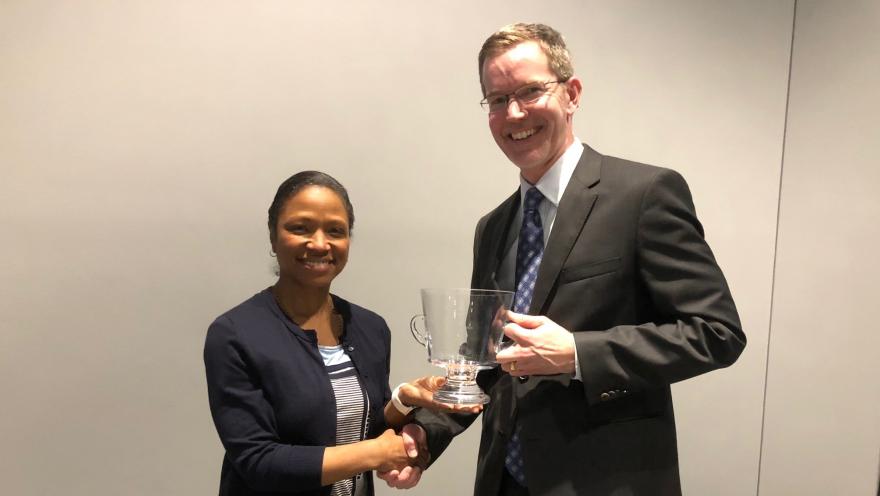Dr. Timothy Miller, the David Clayson Professor of Neurology from the Washington University School of Medicine in St. Louis accepted the 2018 Sheila Essey Award for ALS Research April 23 at the American Academy of Neurology 70th Annual Meeting in Los Angeles.
The ALS Association, in partnership with the American Academy of Neurology and the American Brain Foundation, announced the award in March.
Dr. Miller is a dedicated physician scientist that has worked hard for many years with the goal to uncover effective therapies for ALS. We recently sat down with Dr. Miller to learn more about his impressive career in ALS, his current interests, and how his work has impacted the ALS field.
How will your Sheila Essey Award push your research forward?
My group is very proud to receive the recognition of the distinguished Sheila Essey Award. This honor injects fresh energy into our continued day-to-day pursuit of new therapies for ALS. We intend to use the award to push forward the boundaries of knowledge about this disease by supporting some cutting-edge ideas that otherwise might not receive support in the early stages. This award will, therefore, serve as a springboard for this innovative work.
Do you have a message for people living with ALS and their loved ones?
There is a large community of committed and talented scientists and clinicians working closely together, sharing information frequently, and making important discoveries on a daily basis about ALS. I want those who are impacted by ALS to know that this group is steadfastly behind them and is actively pursuing therapies that can substantially slow down, or even cure, ALS.
What is your academic background?
I completed my undergraduate degree in chemistry and French at the University of Virginia, then finished an M.D. and Ph.D. simultaneously at Washington University in St. Louis. For clinical training in neurology, I completed a residency and fellowship program at the University of California, San Francisco. After conducting a postdoctoral fellowship at the University of California, San Diego for more research training beyond the Ph.D., I then returned to Washington University where I accepted a faculty position and opened the Miller Lab (https://millerlab.wustl.edu/).
Why did you choose to join the ALS field and work on ALS research?
I initially became interested in how to prevent the loss of neurons as a graduate student. Neurons fascinated me because of their complex intrinsic pathways to remain functional over our entire lifetime. Understanding these pathways presented an opportunity to prevent the loss of neurons in disease. So, it was these basic studies of neurons that sparked an interest in neurology during medical school. Then, as a practicing neurologist, I saw the tremendous need for new therapies for neurodegenerative diseases, in particular ALS. Seeing first-hand the struggles of my patients and their families and not being able to provide them with better answers led me to become interested in trying to better understand and treat ALS.
What are your current research interests?
We have developed techniques to shut down the expression of a particular gene that causes some forms of familial ALS and the focus of this promising work is now in clinical trial. We continue to pursue new targets for therapies, with a particular interest in the molecules called micro RNAs, that control how much of particular genes are expressed. Another one of our research areas involves determining how long certain building blocks of cells, called proteins, last in the body. This information will be used to guide future clinical studies and may provide new insights into the causes of ALS.
How can your current research lead to potential ALS treatments?
Our work on developing methods to shut down the toxic products of the SOD1 gene is currently in clinical trial. We do not yet know whether this will become a treatment but are encouraged by the results we have seen in our ALS models. Our goal is to see our ongoing work on discovering new targets for ALS therapies that lead to future clinical trials as well.
What do you think is the most exciting research happening now in the ALS field?
The explosion in genetics has revealed and will continue to reveal an increasing number of clear targets for therapeutics. This expanded knowledge coupled with new tools to more sharply focus therapies such as antisense oligonucleotides (our work), viral delivery, and smart design of small molecules suggests an increasing number of therapeutics on the horizon for ALS.
About the Sheila Essey Award
The Sheila Essey Award for ALS Research is given to acknowledge and honor an individual who is making significant contributions in research. The award is made possible through the generosity of the Essey Family Fund through The ALS Association Golden West Chapter, in memory of Sheila Essey, who battled ALS for 10 years and died from the disease in 2004. Richard Essey, Sheila’s husband, served as a National Trustee of The ALS Association and is one of the founders of the Greater Bay Area Chapter, now the Golden West Chapter. Past recipients have used the funds to continue ALS research or to support promising young scientists on their research teams. The ALS Association and The AAN are deeply grateful for the unwavering commitment of Richard Essey in continuing to support this important honor.
Learn more about the past award winners here.


Join the conversation. Please comment below.